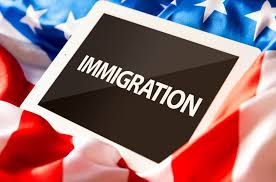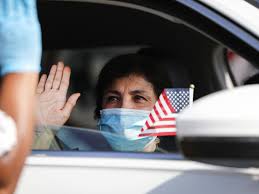How can I speed up immigration in the US?
Everyone wants to get their immigration case done as quickly as possible, but long waits of a year (or many years) can be the norm. One of the most common questions we get is “can you speed up my immigration case?” The answer usually is “it depends on what type of immigration case,” but there are some things you can do to help expedite or speed things up in certain cases.
Here are some quick tips to speeding up your immigration process
U.S. Citizenship and Immigration Services (USCIS) offer a Premium Processing Service.
While it was suspended for a while, premium processing is back in some cases in 2019. For $1410 above regular fees, certain employment based cases may be expedited by filling out an 1-907. But in the big picture, we are talking about certain temporary work visas and petitions that lead to green cards through sponsorship. There are no Premium Processing Services for Family or any other Immigration case. In the case of expedited processing there must be a real reason for rushing and no guarantee that USCIS will approve the request. This is for emergent use only such as family emergencies, military personnel who are being called overseas, or scheduled surgery with a long recuperation period, meaning you might not make your appointment afterwards.
Do not attempt to file the paperwork yourself; normally it slows things down.
Time and again we have people come to us who made an error on their paperwork causing months of waiting while they try to refile or fix the error. It is tempting to think that the best way to get something done is to do it yourself, but with immigration law this is not the case. Many times our clients have tried filing the paperwork on their own, only to find that they used a form that is outdated, or failed to follow some easy-to-miss instruction that can cause the whole package to be rejected, and have to start all over again

Hire A Qualified And Experienced Immigration Attorney.
Highly skilled immigration lawyers know the rules and regulations, which change frequently. We get daily updates on the newest policies, which can have huge effects on your immigration case and your life. A regulation or procedure that worked previously may no longer be supported, or perhaps a new law has opened a path for your particular case, that the average person just wouldn’t know about. Do not go to your family friend who is a divorce attorney, or personal injury lawyer for your immigration case. You wouldn’t go to a dermatologist for open heart surgery, would you? When you hire an outstanding immigration law firm to handle your immigration case, you can be sure they will use methods to ensure that everything is as close to perfect as it can be. I’ve written more on how to choose the best immigration lawyer here.
A final option in some cases is actual contact with an officer at USCIS.
When an immigration case is not completed within a certain, expected period of time, you may contact USCIS to try and speed things up. Again, the best thing to do is to get a professional to handle the process. Experienced immigration lawyers know how to get things accomplished. Thousands of times before, we have done it. We can try to resolve the reason for the delays. This can help.

How Should This Work?
Having done hundreds of these cases in my legal career, I would suggest there are only three major concerns in spousal cases, and the following are the ways we can address them in an expeditious manner:
1) Is the marriage real or a marriage of convenience just to gain entry into the United States?
To overcome the concern, I would suggest we tentatively accept a prima facie bona fide marriage certificate from a credible source, such as for example, a certificate from the U.S., Canada, the Commonwealth or the E.U. If an application contains a suspect certificate, then the applicants should be steered into the normal current processing channel.
2) Is the foreign spouse a criminal or are there security concerns related to that spouse?
To overcome this concern, I would suggest we tentatively accept a prima facie bona fide police report from every country where that spouse lived for six months or longer as an adult. A further security clearance can be performed by U.S. officials as part of the approval for a conditional green card.
3) Is the foreign spouse healthy, or is that spouse bringing in some sort of contagious disease we need to be worried about?
I would suggest we accept a medical clearance from a U.S. trained doctor approved by the USCIS.
Assuming the foreign spouse can provide these three items, they should be issued a two-year conditional green card. In my view such approvals should not take long to process and could be granted within a few weeks, and not longer than say, six months. Should an officer have any concerns about any such application, they should be able to block such cases with a statutory declaration setting out objections on reasonable and probable grounds. Then a senior official in their office should decide. If blocked, the file would be diverted into the normal processing stream.

How to Speed Up the Green Card Application Process
Waiting for a green card can be a long and trying procedure. Because of the large number of people who wish to immigrate to the United States, and limits on the numbers of green cards or visas that can be given out annually in certain categories, U.S. immigration authorities are usually heavily backlogged with applications.
Is there any way to speed up the process so that your green card gets approved faster? For the most part, speeding up the process is impossible. However, below we will give you some tips for avoiding unusual or disastrous sorts of delays.
Warning: The coronavirus or COVID-19 pandemic has resulted in long delays in every part of every immigration process. As of May 2020, there is almost no way to complete the green card process at all, owing to government office closures to in-person visits. Even after things reopen, expect delays as the U.S. government makes its way through the backlog.
Understand the Usual Timeline for Your Green Card or Visa
It’s important to understand what is considered “normal” in the process of applying for a green card or visa. No matter what, it will probably take longer than you would like. Do your research at the beginning, so that you will not be surprised by the following:
- The usual bureaucratic backlog in your application category. This can often be checked online. For example, if you’re applying to U.S. Citizenship and Immigration Services (USCIS), try using the Check Case Processing Times page of its website to get an indication of the current, average wait times for particular applications. Or if you already have a receipt for an application, go to the Case Status Online page.
- Whether annual limits slow down visa availability in your category. If, for example, you are applying for a family-based visa and are not the immediate relative of a U.S. citizen, you are in what’s called a “preference category,” where annual limits apply. That means you will likely wait years on a waiting list for a visa number to become available. Similarly, annual limits on employment-based green cards result in long waits in certain categories. Your place on the waiting list depends on your “priority date,” which is based on the date that either your family-based I-130 petition or your labor certification was first filed. To check on what priority dates are currently becoming eligible for visas, see the State Department ‘s latest Visa Bulletin.
When to Ask for Expedited Processing
In rare cases, when you’re facing a true emergency, you might be able to ask the immigration authorities to speed up consideration of your case. For example, if you’re trying to get a fiancé visa for an immigrant who is hoping to get married before receiving a much-needed kidney transplant, that might be grounds for a request for expedited processing. You would want to submit a letter to whoever is handling your case, along with documentation proving the emergency. In normal circumstances, however, bugging the immigration authorities to put your application ahead of the rest will get you nowhere.
Carefully Preparing Your Green Card or Visa Application
By far the best thing that you can do to make sure that your green card application is processed as quickly as possible is to make sure that all of your paperwork is in order prior to filing. If you leave something out of an application, the whole thing can be sent back to you, or you might receive a letter requesting follow-up documents. Such issues invariably add weeks or months to the process. Carefully read and follow any instructions from USCIS or other immigration authorities regarding your paperwork. Check many times over to be sure that you have filled in all of the requested information on your forms and included the appropriate documents, fee, and photos.